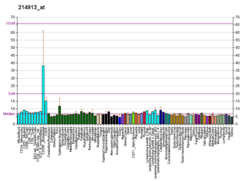ADAMTS3

| ADAMTS3 | |||||||||||||||||||||||||||||||||||||||||||||||||||
|---|---|---|---|---|---|---|---|---|---|---|---|---|---|---|---|---|---|---|---|---|---|---|---|---|---|---|---|---|---|---|---|---|---|---|---|---|---|---|---|---|---|---|---|---|---|---|---|---|---|---|---|
| Identifiers | |||||||||||||||||||||||||||||||||||||||||||||||||||
| Aliases | ADAMTS3, ADAMTS-4, ADAM metallopeptidase with thrombospondin type 1 motif 3, HKLLS3 | ||||||||||||||||||||||||||||||||||||||||||||||||||
| External IDs | OMIM: 605011; MGI: 3045353; HomoloGene: 8596; GeneCards: ADAMTS3; OMA:ADAMTS3 - orthologs | ||||||||||||||||||||||||||||||||||||||||||||||||||
| |||||||||||||||||||||||||||||||||||||||||||||||||||
| |||||||||||||||||||||||||||||||||||||||||||||||||||
| |||||||||||||||||||||||||||||||||||||||||||||||||||
| |||||||||||||||||||||||||||||||||||||||||||||||||||
| |||||||||||||||||||||||||||||||||||||||||||||||||||
| Wikidata | |||||||||||||||||||||||||||||||||||||||||||||||||||
| |||||||||||||||||||||||||||||||||||||||||||||||||||
A disintegrin and metalloproteinase with thrombospondin motifs 3 is an enzyme that in humans is encoded by the ADAMTS3 gene.[5][6] The protein encoded by this gene is the major procollagen II N-propeptidase.[6]
Structure
[edit]This gene encodes a member of the ADAMTS (a disintegrin and metalloproteinase with thrombospondin motifs) protein family. Members of the family share several distinct protein modules, including a propeptide region, a metalloproteinase domain, a disintegrin-like domain, and a thrombospondin type 1 (TS) motif. Individual members of this family differ in the number of C-terminal TS motifs, and some have unique C-terminal domains. The protein encoded by this gene is the major procollagen II N-propeptidase.[6]
Function
[edit]Because of the high similarity to ADAMTS2, the major substrate of ADAMTS3 had been erroneously assumed to be procollagen II.[7] However, ADAMTS3 appears largely irrelevant for collagen maturation but instead is required for the activation of the lymphangiogenic growth factor VEGF-C.[8] Hence, ADAMTS3 is essential for the development and growth of lymphatic vessels. The proteolytic processing of VEGF-C by ADAMTS3 is regulated by the CCBE1 protein.
ADAMTS3 has been shown to cleave reelin, a protein that regulates the proper lamination of the brain cortex and whose signal activity is found to be disrupted in a number of neuropsychiatric conditions.[9]
Clinical significance
[edit]A deficiency of this protein may be responsible for dermatosparaxis, a genetic defect of connective tissues.[6]
Some hereditary forms of lymphedema are caused by mutations in ADAMTS3.[10][11]
References
[edit]- ^ a b c GRCh38: Ensembl release 89: ENSG00000156140 – Ensembl, May 2017
- ^ a b c GRCm38: Ensembl release 89: ENSMUSG00000043635 – Ensembl, May 2017
- ^ "Human PubMed Reference:". National Center for Biotechnology Information, U.S. National Library of Medicine.
- ^ "Mouse PubMed Reference:". National Center for Biotechnology Information, U.S. National Library of Medicine.
- ^ Tang BL, Hong W (February 1999). "ADAMTS: a novel family of proteases with an ADAM protease domain and thrombospondin 1 repeats". FEBS Letters. 445 (2–3): 223–5. doi:10.1016/S0014-5793(99)00119-2. PMID 10094461. S2CID 37955930.
- ^ a b c d "Entrez Gene: ADAMTS3 ADAM metallopeptidase with thrombospondin type 1 motif, 3".
- ^ Fernandes RJ, Hirohata S, Engle JM, Colige A, Cohn DH, Eyre DR, Apte SS (August 2001). "Procollagen II amino propeptide processing by ADAMTS-3. Insights on dermatosparaxis". The Journal of Biological Chemistry. 276 (34): 31502–9. doi:10.1074/jbc.M103466200. PMID 11408482.
- ^ Jeltsch M, Jha SK, Tvorogov D, Anisimov A, Leppänen VM, Holopainen T, Kivelä R, Ortega S, Kärpanen T, Alitalo K (May 2014). "CCBE1 enhances lymphangiogenesis via A disintegrin and metalloprotease with thrombospondin motifs-3-mediated vascular endothelial growth factor-C activation". Circulation. 129 (19): 1962–71. doi:10.1161/CIRCULATIONAHA.113.002779. PMID 24552833.
- ^ Hattori M, Kohno T (February 2021). "Regulation of Reelin functions by specific proteolytic processing in the brain". Journal of Biochemistry. 169 (5): 511–516. doi:10.1093/jb/mvab015. PMID 33566063.
- ^ Jha SK, Rauniyar K, Karpanen T, Leppänen VM, Brouillard P, Vikkula M, Alitalo K, Jeltsch M (July 2017). "Efficient activation of the lymphangiogenic growth factor VEGF-C requires the C-terminal domain of VEGF-C and the N-terminal domain of CCBE1". Scientific Reports. 7 (1): 4916. Bibcode:2017NatSR...7.4916J. doi:10.1038/s41598-017-04982-1. PMC 5501841. PMID 28687807.
- ^ Brouillard P, Dupont L, Helaers R, Coulie R, Tiller GE, Peeden J, Colige A, Vikkula M (November 2017). "Loss of ADAMTS3 activity causes Hennekam lymphangiectasia-lymphedema syndrome 3". Human Molecular Genetics. 26 (21): 4095–4104. doi:10.1093/hmg/ddx297. PMID 28985353.
Further reading
[edit]- Tang BL (January 2001). "ADAMTS: a novel family of extracellular matrix proteases". The International Journal of Biochemistry & Cell Biology. 33 (1): 33–44. doi:10.1016/S1357-2725(00)00061-3. PMID 11167130.
- Martel-Pelletier J, Welsch DJ, Pelletier JP (December 2001). "Metalloproteases and inhibitors in arthritic diseases". Best Practice & Research. Clinical Rheumatology. 15 (5): 805–29. doi:10.1053/berh.2001.0195. PMID 11812023.
- Hirohata S (November 2001). "[ADAMTS family--new extracellular matrix degrading enzyme]". Seikagaku. The Journal of Japanese Biochemical Society. 73 (11): 1333–7. PMID 11831030.
- Hurskainen TL, Hirohata S, Seldin MF, Apte SS (September 1999). "ADAM-TS5, ADAM-TS6, and ADAM-TS7, novel members of a new family of zinc metalloproteases. General features and genomic distribution of the ADAM-TS family". The Journal of Biological Chemistry. 274 (36): 25555–63. doi:10.1074/jbc.274.36.25555. PMID 10464288.
- Colige A, Vandenberghe I, Thiry M, Lambert CA, Van Beeumen J, Li SW, Prockop DJ, Lapiere CM, Nusgens BV (February 2002). "Cloning and characterization of ADAMTS-14, a novel ADAMTS displaying high homology with ADAMTS-2 and ADAMTS-3". The Journal of Biological Chemistry. 277 (8): 5756–66. doi:10.1074/jbc.M105601200. PMID 11741898.
External links
[edit]- The MEROPS online database for peptidases and their inhibitors: M12.220
- Human ADAMTS3 genome location and ADAMTS3 gene details page in the UCSC Genome Browser.




